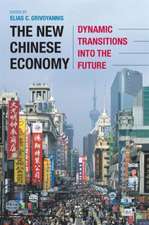Postwar Japanese Economy: Lessons of Economic Growth and the Bubble Economy
Autor Mitsuhiko Iyodaen Limba Engleză Hardback – 17 aug 2010
| Toate formatele și edițiile | Preț | Express |
|---|---|---|
| Paperback (1) | 634.49 lei 6-8 săpt. | |
| Springer – 20 noi 2014 | 634.49 lei 6-8 săpt. | |
| Hardback (1) | 640.71 lei 6-8 săpt. | |
| Springer – 17 aug 2010 | 640.71 lei 6-8 săpt. |
Preț: 640.71 lei
Preț vechi: 753.77 lei
-15% Nou
Puncte Express: 961
Preț estimativ în valută:
122.64€ • 133.26$ • 103.08£
122.64€ • 133.26$ • 103.08£
Carte tipărită la comandă
Livrare economică 21 aprilie-05 mai
Preluare comenzi: 021 569.72.76
Specificații
ISBN-13: 9781441963314
ISBN-10: 1441963316
Pagini: 160
Ilustrații: XVII, 157 p.
Dimensiuni: 155 x 235 x 18 mm
Greutate: 0.43 kg
Ediția:2010
Editura: Springer
Colecția Springer
Locul publicării:New York, NY, United States
ISBN-10: 1441963316
Pagini: 160
Ilustrații: XVII, 157 p.
Dimensiuni: 155 x 235 x 18 mm
Greutate: 0.43 kg
Ediția:2010
Editura: Springer
Colecția Springer
Locul publicării:New York, NY, United States
Public țintă
ResearchCuprins
Historical Changes of the Japanese Economy.- Recovery Period (Reforms, Social and Political Changes, and Economic Policy).- Rapid Economic Growth.- Results of the Rapid Economic Growth: Positive Effects.- Results of the Rapid Economic Growth: Negative Effects or Distortions.- Bubble Economy and Its Generation.- Bursting the Bubble and Its Consequences.- Toward a Welfare-Oriented Society: Some Lessons from Rapid Economic Growth and the Bubble Economy.- Income and Asset Distribution, and the Relative Share.- Households and Pension.- Toward the Quality of Life in the Mature Society (Summary and Lessons).
Textul de pe ultima copertă
Since the end of World War II, the Japanese economy has seen rapid changes and remarkable progress. It has also experienced a bubble economy and period of prolonged stagnation. The book seeks to address three major questions: What kind of changes have taken place in the postwar years? In what sense has there been progress? What lessons can be drawn from the experiences?The book is organized as follows: It begins with an overview of the postwar Japanese economy, using data to highlight historical changes. The four major economic issues in the postwar Japanese economy (economic restoration, rapid economic growth, the bubble economy and current topics) are addressed, with particular focus on the meaning of economic growth and the bubble economy. The next chapters examine the important economic issues for Japan related to a welfare-oriented society, including income distribution, asset distribution, and the relative share of income. Another chapter deals with the household structure of Japan, the pension issue, and the importance of the effect of demographic change on income distribution. The final chapter gives a brief summary, examines quality of life as a lesson of this research, and briefly outlines a proposal for a basic design towards achieving a high satisfaction level society.This book will be of interest to economists, economic historians and political scientists and would be useful as a text for any course on the Japanese economy.
Caracteristici
Gives the reader an overview of the Japanese economy during the entire postwar period Uses statistical tables and charts to illustrate current and historical economic issues Addresses the problems of the bubble economy and proposes solutions with emphasis on quality of life Includes supplementary material: sn.pub/extras










